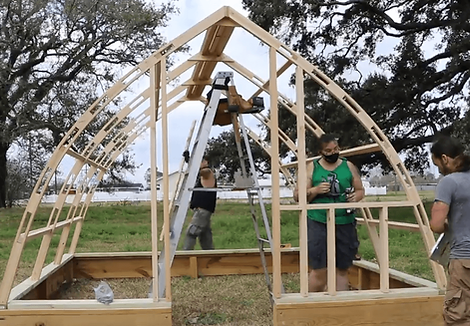OKLA HINA IKHISH HOLO
PEOPLE OF THE SACRED MEDICINE TRAIL
A network of femme and nonbinary Indigenous gardeners
growing Food Sovereignty in the Gulf South
Program Update
In January 2024, members of the WECAN project, Okla Hina Ikhish Holo, in collaboration with an Intertribal collective of Artists, Educators, Researchers, Gardeners, Herbalists, Water Protectors, Land Defenders and Culture Keepers are stewarding the building of Nanih Bvlbancha. "Nanih" is a Chahta (Choctaw) word for hill or mountain, and is commonly used to describe Indigenous ancestral earthen mound architecture.
Nanih Bvlbancha is a site that will include native plant gardens and a stickball field with intentions to provide pathways to health and healing, as well as a site for contemporary Indigenous lifeways, and communal gatherings. This project is a part of Prospect New Orleans Artist of Public Memory modern monument initiative. Please learn more about Nanih Bvlbancha here.
Photo rendition of Nanih Bvlbancha courtesy of the Nanih Bvlbancha website.

.jpg)
Kellyn LaCour-Conant (Clifton Choctaw/Cane River Creole) checks in on the plants at their farm in Louisiana.
At the end of the Mississippi River, in the place the Chahta (Choctaw) call Bvlbancha, the Okla Hina Ikhish Holo, People of the Sacred Medicine Trail, a network of femme and nonbinary Indigenous gardeners, is working urgently to respond to the climate crisis.
As climate catastrophes worsen, and extreme droughts and flooding become the new normal, it is imperative that Indigenous communities lead as we develop renewed systems for climate justice and food sovereignty. Globally, 80% of biodiversity existing within Indigenous territories, and several studies confirm that Indigenous peoples are the best stewards of their homelands, with Indigenous women and femmes providing the backbone of their communities and holding vast knowledge and skill gleaned through their traditional role as healers, culture shapers, and caretakers of water and land.
Okla Hina Ikhish Holo is re-establishing old trade routes and networks while adapting and co-designing new future paths for tradeways that strengthen decentralized systems of support, build circular economies, and support local biodiversity, food sovereignty, and stewardship of their traditional territories.

Learn more about the Okla Hina Ikhish Holo Network in the video below!
In the Mississippi River Delta, lndigenous territories are disappearing at one of the fastest rates on earth, due to a legacy of extractive practices and a changing climate. Developing and supporting local Indigenous food networks is crucial for ensuring the continuation of sacred and long-standing cultural practices connected to food, medicine, and the land.
The network spans across the United States Gulf South, along old Native trade routes, within the traditional and contemporary territories of the Chata, the Mvskoke, the Biloxi, the Tunica, the Attakapas-Ishak, the United Houma Nation, the Chitimatcha, the Washa, the Chawasha, the Tchopitoulas, the Bayougoula, and upon the lands that were home to the ancestors of the Nations whose names were erased during the early years of European contact. Additionally, these are the adopted homelands of other Nations who found their way to the southeast in search of sovereignty.
Ida Aronson (United Houma Nation) builds a new greenhouse at the Yekani Ekelanna Garden in Louisiana.
%20(1)%20(1).png)
Dr. Tammy Greer (United Houma Nation) shares some of the herbs and medicines from her garden in southern Mississippi.
.jpg)
Okla Hina Ikhish Holo, in collaboration with the Women’s Earth and Climate Action Network (WECAN), is working to defend and protect and to restore their lands and waters in the Mississippi River Delta and within the ancestral territories of the Chata and Mvskoke. Network members include: Ida Aronson (United Houma Nation), Dr. Tammy Greer (United Houma Nation), Angela Comeaux (Mvskoke / Cherokee / Chahta), Sasha Irby (Osage / Lakota / Mvskoke), Jenna Mae (Eastern Siouan / Mvskoke / Cherokee), Kellyn LaCour-Conant (Clifton Choctaw/Cane River Creole), Virginia Dove Richard (MOWA Band of Choctaw), Anne White Hat (Sicangu Lakota), and Monique Verdin (United Houma Nation).
